Organisation Behaviour: Culture, Politics, Power, and Motivation
VerifiedAdded on 2023/06/18
|19
|5749
|259
Report
AI Summary
This report provides a comprehensive analysis of organisation behaviour, focusing on the influence of culture, politics, and power on individual and team performance within Marks and Spencer. It explores various cultural models, including Handy's model and Hofstede's dimensions, to understand their impact on the workplace. The report also discusses different types of organisational power and the role of politics in shaping organisational changes. Furthermore, it examines content process theories of motivation, particularly Maslow's hierarchy of needs, and their application in motivating employees. The report concludes by analysing effective and ineffective team dynamics and the relationship between organisational behaviour philosophies and leadership styles, providing insights into creating a positive and productive work environment.
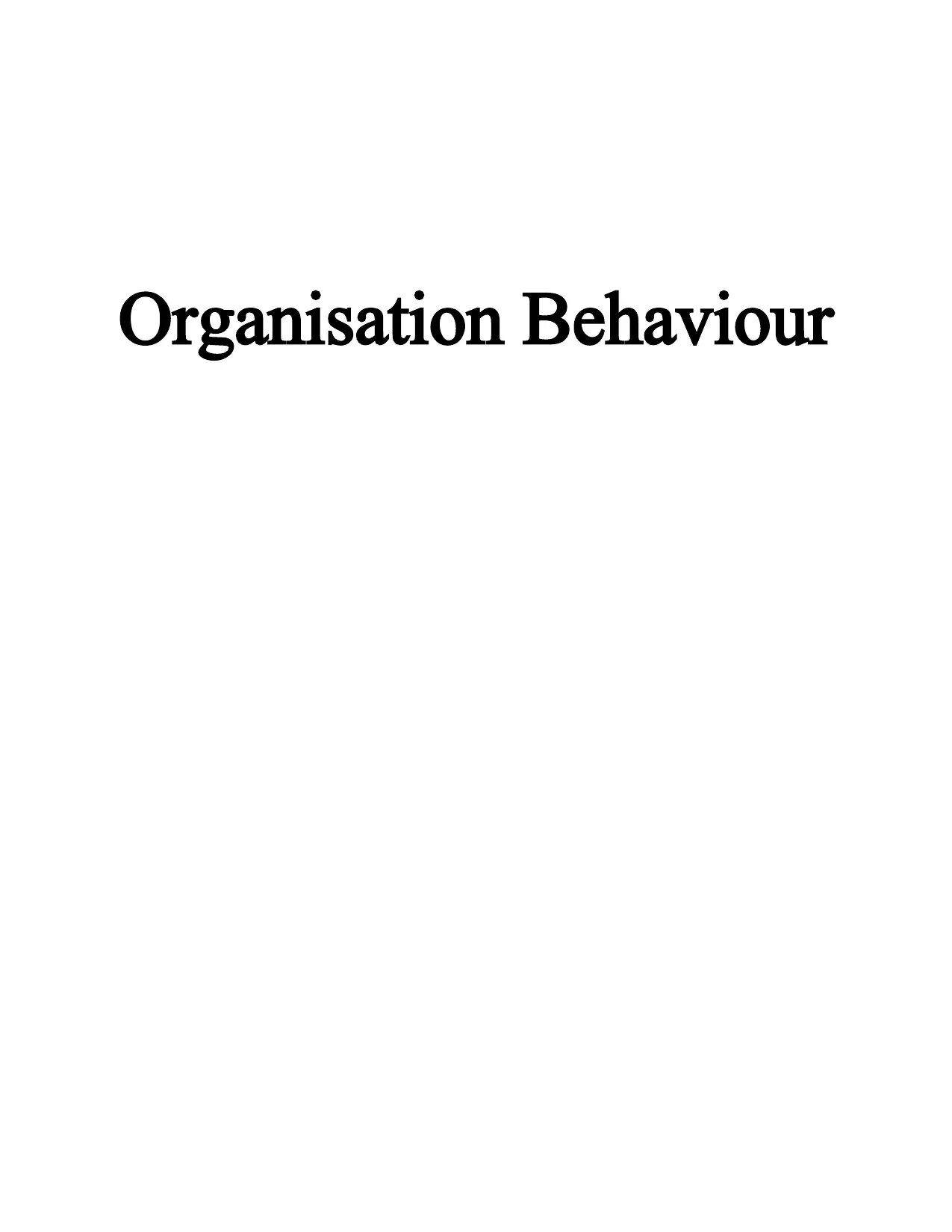
Organisation Behaviour
Paraphrase This Document
Need a fresh take? Get an instant paraphrase of this document with our AI Paraphraser
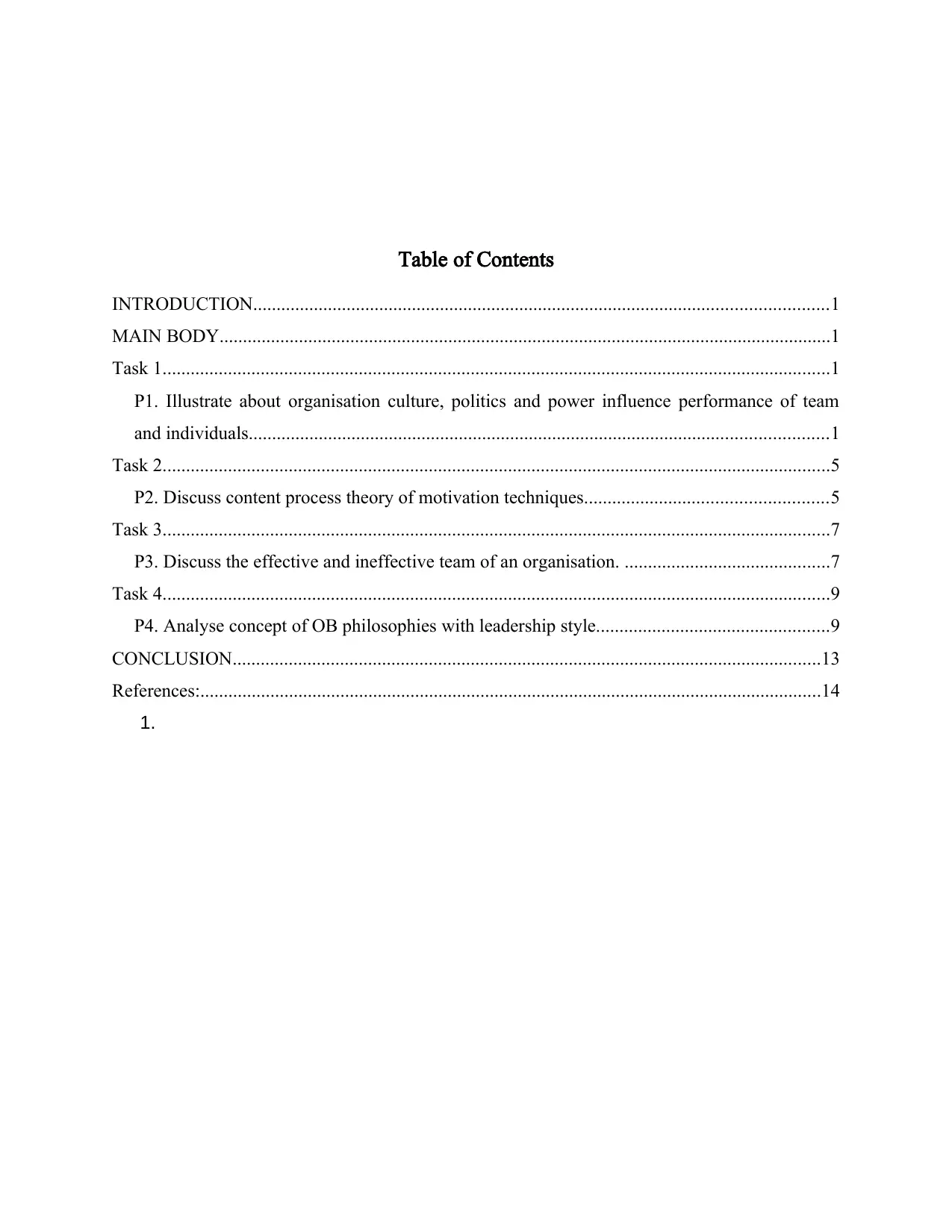
Table of Contents
INTRODUCTION...........................................................................................................................1
MAIN BODY...................................................................................................................................1
Task 1...............................................................................................................................................1
P1. Illustrate about organisation culture, politics and power influence performance of team
and individuals............................................................................................................................1
Task 2...............................................................................................................................................5
P2. Discuss content process theory of motivation techniques....................................................5
Task 3...............................................................................................................................................7
P3. Discuss the effective and ineffective team of an organisation. ............................................7
Task 4...............................................................................................................................................9
P4. Analyse concept of OB philosophies with leadership style..................................................9
CONCLUSION..............................................................................................................................13
References:.....................................................................................................................................14
1.
INTRODUCTION...........................................................................................................................1
MAIN BODY...................................................................................................................................1
Task 1...............................................................................................................................................1
P1. Illustrate about organisation culture, politics and power influence performance of team
and individuals............................................................................................................................1
Task 2...............................................................................................................................................5
P2. Discuss content process theory of motivation techniques....................................................5
Task 3...............................................................................................................................................7
P3. Discuss the effective and ineffective team of an organisation. ............................................7
Task 4...............................................................................................................................................9
P4. Analyse concept of OB philosophies with leadership style..................................................9
CONCLUSION..............................................................................................................................13
References:.....................................................................................................................................14
1.
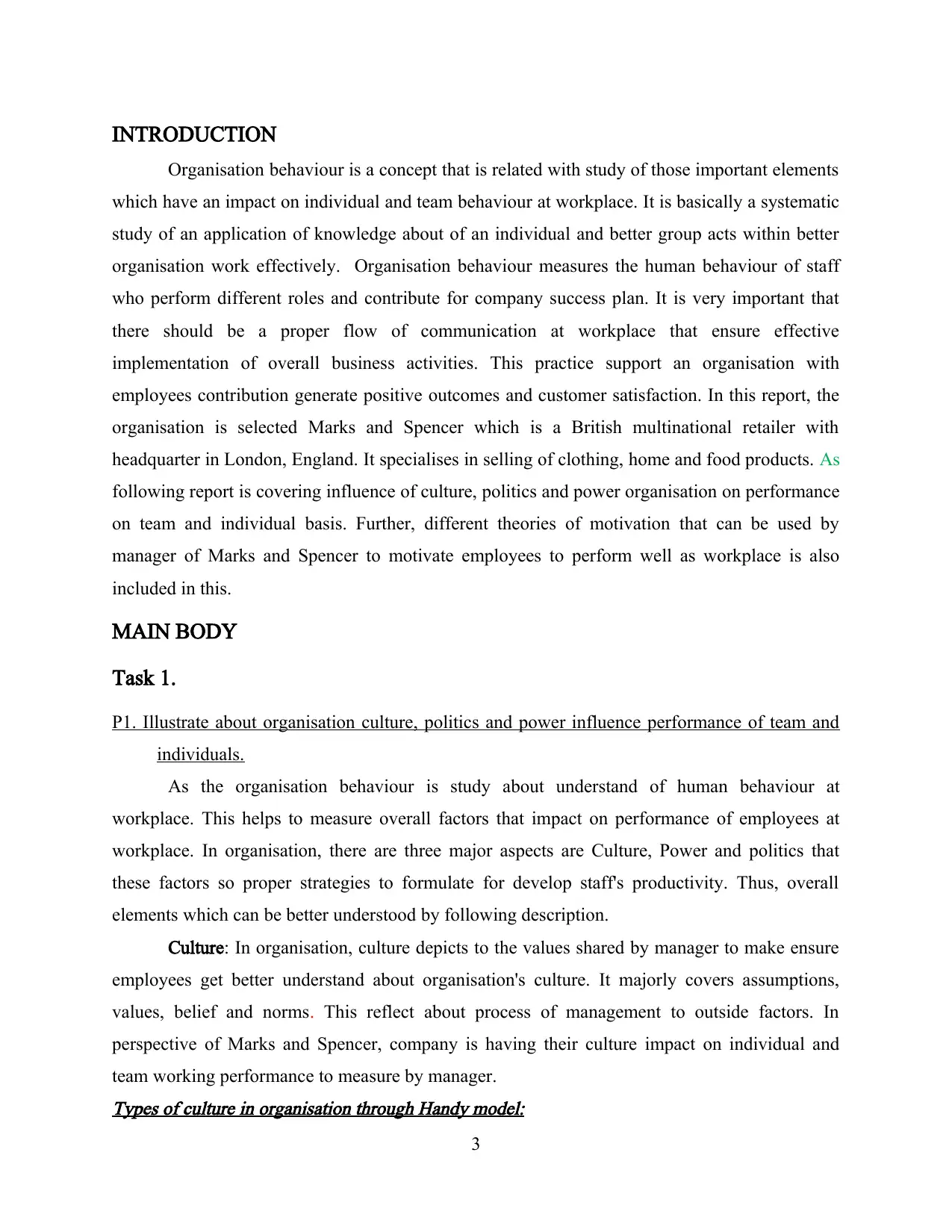
INTRODUCTION
Organisation behaviour is a concept that is related with study of those important elements
which have an impact on individual and team behaviour at workplace. It is basically a systematic
study of an application of knowledge about of an individual and better group acts within better
organisation work effectively. Organisation behaviour measures the human behaviour of staff
who perform different roles and contribute for company success plan. It is very important that
there should be a proper flow of communication at workplace that ensure effective
implementation of overall business activities. This practice support an organisation with
employees contribution generate positive outcomes and customer satisfaction. In this report, the
organisation is selected Marks and Spencer which is a British multinational retailer with
headquarter in London, England. It specialises in selling of clothing, home and food products. As
following report is covering influence of culture, politics and power organisation on performance
on team and individual basis. Further, different theories of motivation that can be used by
manager of Marks and Spencer to motivate employees to perform well as workplace is also
included in this.
MAIN BODY
Task 1.
P1. Illustrate about organisation culture, politics and power influence performance of team and
individuals.
As the organisation behaviour is study about understand of human behaviour at
workplace. This helps to measure overall factors that impact on performance of employees at
workplace. In organisation, there are three major aspects are Culture, Power and politics that
these factors so proper strategies to formulate for develop staff's productivity. Thus, overall
elements which can be better understood by following description.
Culture: In organisation, culture depicts to the values shared by manager to make ensure
employees get better understand about organisation's culture. It majorly covers assumptions,
values, belief and norms. This reflect about process of management to outside factors. In
perspective of Marks and Spencer, company is having their culture impact on individual and
team working performance to measure by manager.Types of culture in organisation through Handy model:
3
Organisation behaviour is a concept that is related with study of those important elements
which have an impact on individual and team behaviour at workplace. It is basically a systematic
study of an application of knowledge about of an individual and better group acts within better
organisation work effectively. Organisation behaviour measures the human behaviour of staff
who perform different roles and contribute for company success plan. It is very important that
there should be a proper flow of communication at workplace that ensure effective
implementation of overall business activities. This practice support an organisation with
employees contribution generate positive outcomes and customer satisfaction. In this report, the
organisation is selected Marks and Spencer which is a British multinational retailer with
headquarter in London, England. It specialises in selling of clothing, home and food products. As
following report is covering influence of culture, politics and power organisation on performance
on team and individual basis. Further, different theories of motivation that can be used by
manager of Marks and Spencer to motivate employees to perform well as workplace is also
included in this.
MAIN BODY
Task 1.
P1. Illustrate about organisation culture, politics and power influence performance of team and
individuals.
As the organisation behaviour is study about understand of human behaviour at
workplace. This helps to measure overall factors that impact on performance of employees at
workplace. In organisation, there are three major aspects are Culture, Power and politics that
these factors so proper strategies to formulate for develop staff's productivity. Thus, overall
elements which can be better understood by following description.
Culture: In organisation, culture depicts to the values shared by manager to make ensure
employees get better understand about organisation's culture. It majorly covers assumptions,
values, belief and norms. This reflect about process of management to outside factors. In
perspective of Marks and Spencer, company is having their culture impact on individual and
team working performance to measure by manager.Types of culture in organisation through Handy model:
3
⊘ This is a preview!⊘
Do you want full access?
Subscribe today to unlock all pages.

Trusted by 1+ million students worldwide
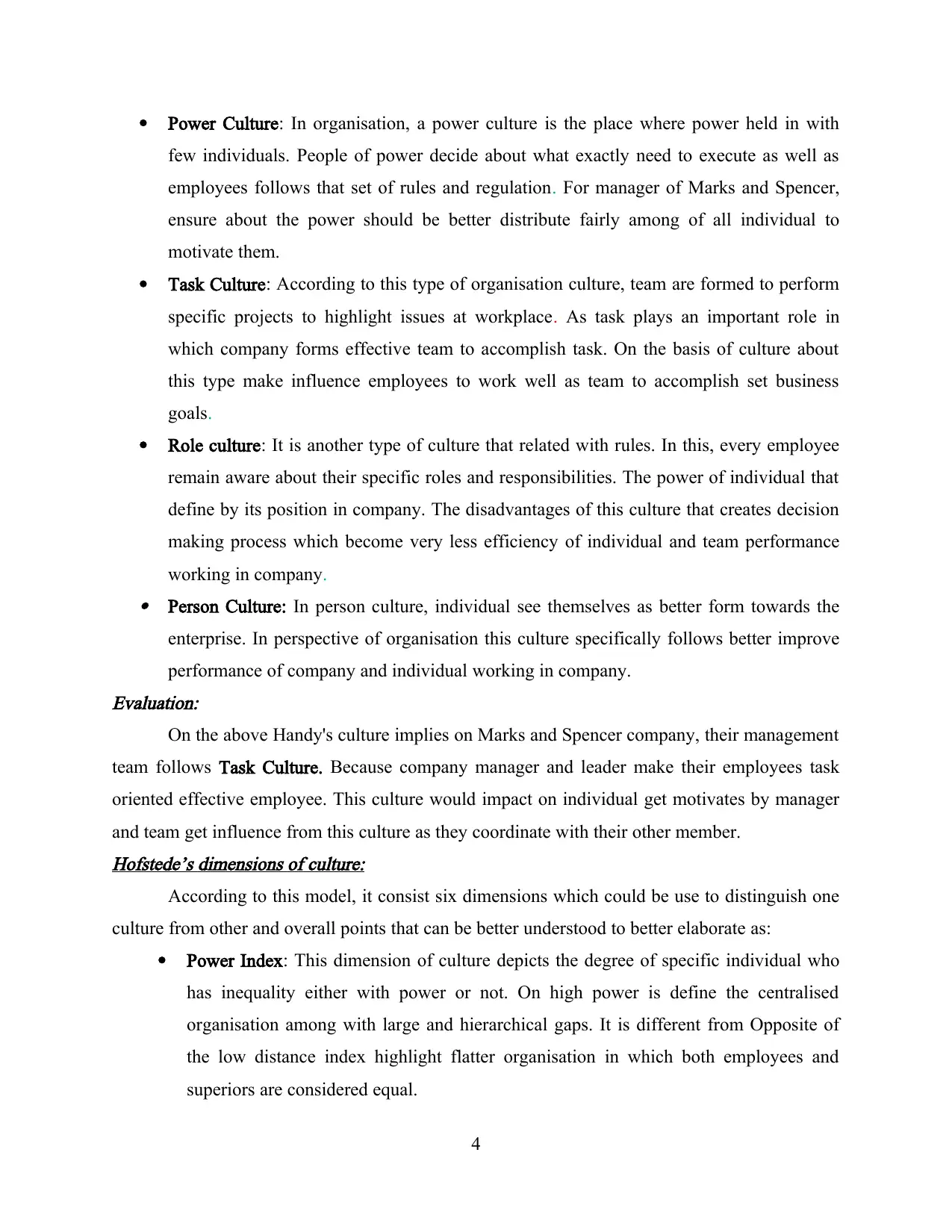
Power Culture: In organisation, a power culture is the place where power held in with
few individuals. People of power decide about what exactly need to execute as well as
employees follows that set of rules and regulation. For manager of Marks and Spencer,
ensure about the power should be better distribute fairly among of all individual to
motivate them.
Task Culture: According to this type of organisation culture, team are formed to perform
specific projects to highlight issues at workplace. As task plays an important role in
which company forms effective team to accomplish task. On the basis of culture about
this type make influence employees to work well as team to accomplish set business
goals.
Role culture: It is another type of culture that related with rules. In this, every employee
remain aware about their specific roles and responsibilities. The power of individual that
define by its position in company. The disadvantages of this culture that creates decision
making process which become very less efficiency of individual and team performance
working in company. Person Culture: In person culture, individual see themselves as better form towards the
enterprise. In perspective of organisation this culture specifically follows better improve
performance of company and individual working in company.Evaluation:
On the above Handy's culture implies on Marks and Spencer company, their management
team follows Task Culture. Because company manager and leader make their employees task
oriented effective employee. This culture would impact on individual get motivates by manager
and team get influence from this culture as they coordinate with their other member.Hofstede’s dimensions of culture:
According to this model, it consist six dimensions which could be use to distinguish one
culture from other and overall points that can be better understood to better elaborate as:
Power Index: This dimension of culture depicts the degree of specific individual who
has inequality either with power or not. On high power is define the centralised
organisation among with large and hierarchical gaps. It is different from Opposite of
the low distance index highlight flatter organisation in which both employees and
superiors are considered equal.
4
few individuals. People of power decide about what exactly need to execute as well as
employees follows that set of rules and regulation. For manager of Marks and Spencer,
ensure about the power should be better distribute fairly among of all individual to
motivate them.
Task Culture: According to this type of organisation culture, team are formed to perform
specific projects to highlight issues at workplace. As task plays an important role in
which company forms effective team to accomplish task. On the basis of culture about
this type make influence employees to work well as team to accomplish set business
goals.
Role culture: It is another type of culture that related with rules. In this, every employee
remain aware about their specific roles and responsibilities. The power of individual that
define by its position in company. The disadvantages of this culture that creates decision
making process which become very less efficiency of individual and team performance
working in company. Person Culture: In person culture, individual see themselves as better form towards the
enterprise. In perspective of organisation this culture specifically follows better improve
performance of company and individual working in company.Evaluation:
On the above Handy's culture implies on Marks and Spencer company, their management
team follows Task Culture. Because company manager and leader make their employees task
oriented effective employee. This culture would impact on individual get motivates by manager
and team get influence from this culture as they coordinate with their other member.Hofstede’s dimensions of culture:
According to this model, it consist six dimensions which could be use to distinguish one
culture from other and overall points that can be better understood to better elaborate as:
Power Index: This dimension of culture depicts the degree of specific individual who
has inequality either with power or not. On high power is define the centralised
organisation among with large and hierarchical gaps. It is different from Opposite of
the low distance index highlight flatter organisation in which both employees and
superiors are considered equal.
4
Paraphrase This Document
Need a fresh take? Get an instant paraphrase of this document with our AI Paraphraser
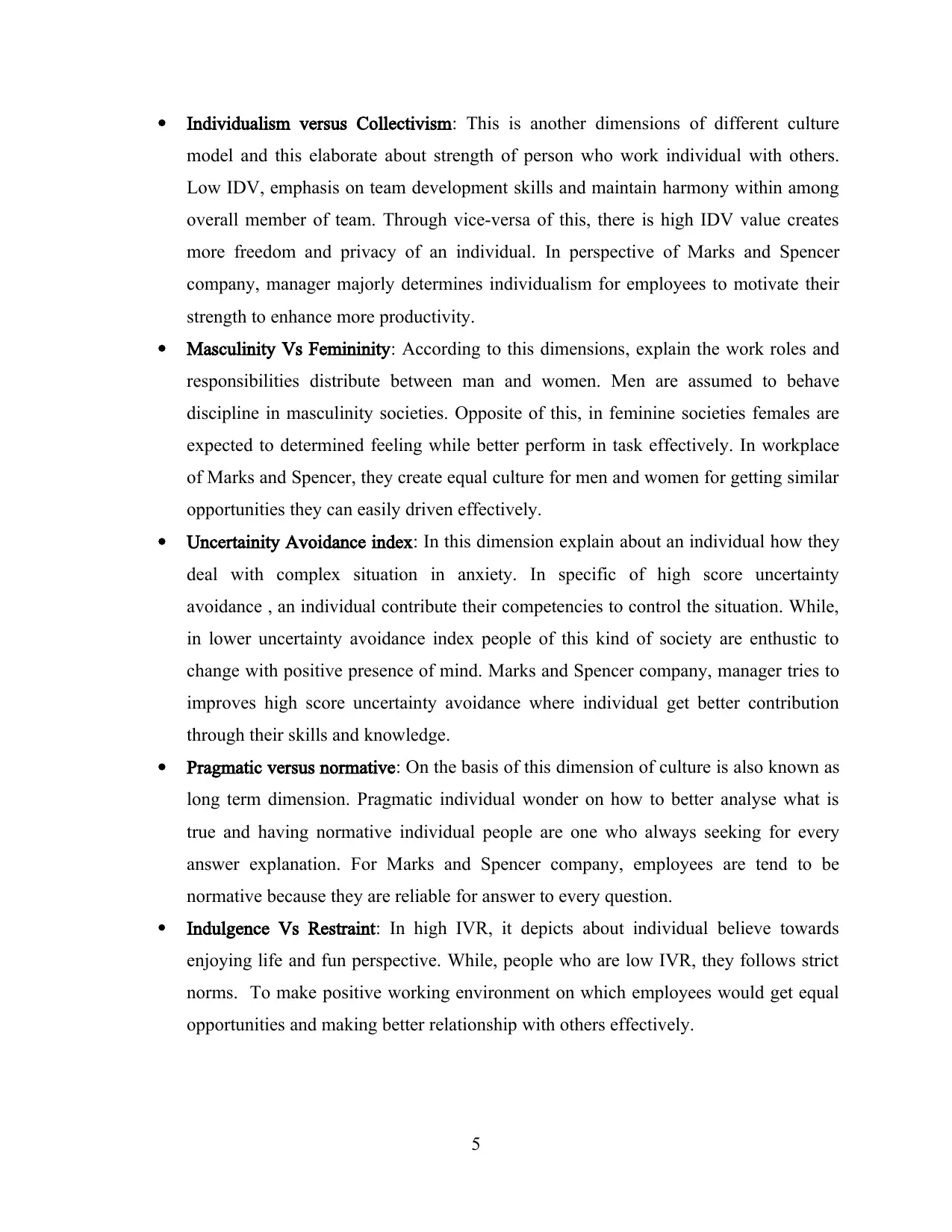
Individualism versus Collectivism: This is another dimensions of different culture
model and this elaborate about strength of person who work individual with others.
Low IDV, emphasis on team development skills and maintain harmony within among
overall member of team. Through vice-versa of this, there is high IDV value creates
more freedom and privacy of an individual. In perspective of Marks and Spencer
company, manager majorly determines individualism for employees to motivate their
strength to enhance more productivity.
Masculinity Vs Femininity: According to this dimensions, explain the work roles and
responsibilities distribute between man and women. Men are assumed to behave
discipline in masculinity societies. Opposite of this, in feminine societies females are
expected to determined feeling while better perform in task effectively. In workplace
of Marks and Spencer, they create equal culture for men and women for getting similar
opportunities they can easily driven effectively.
Uncertainity Avoidance index: In this dimension explain about an individual how they
deal with complex situation in anxiety. In specific of high score uncertainty
avoidance , an individual contribute their competencies to control the situation. While,
in lower uncertainty avoidance index people of this kind of society are enthustic to
change with positive presence of mind. Marks and Spencer company, manager tries to
improves high score uncertainty avoidance where individual get better contribution
through their skills and knowledge.
Pragmatic versus normative: On the basis of this dimension of culture is also known as
long term dimension. Pragmatic individual wonder on how to better analyse what is
true and having normative individual people are one who always seeking for every
answer explanation. For Marks and Spencer company, employees are tend to be
normative because they are reliable for answer to every question.
Indulgence Vs Restraint: In high IVR, it depicts about individual believe towards
enjoying life and fun perspective. While, people who are low IVR, they follows strict
norms. To make positive working environment on which employees would get equal
opportunities and making better relationship with others effectively.
5
model and this elaborate about strength of person who work individual with others.
Low IDV, emphasis on team development skills and maintain harmony within among
overall member of team. Through vice-versa of this, there is high IDV value creates
more freedom and privacy of an individual. In perspective of Marks and Spencer
company, manager majorly determines individualism for employees to motivate their
strength to enhance more productivity.
Masculinity Vs Femininity: According to this dimensions, explain the work roles and
responsibilities distribute between man and women. Men are assumed to behave
discipline in masculinity societies. Opposite of this, in feminine societies females are
expected to determined feeling while better perform in task effectively. In workplace
of Marks and Spencer, they create equal culture for men and women for getting similar
opportunities they can easily driven effectively.
Uncertainity Avoidance index: In this dimension explain about an individual how they
deal with complex situation in anxiety. In specific of high score uncertainty
avoidance , an individual contribute their competencies to control the situation. While,
in lower uncertainty avoidance index people of this kind of society are enthustic to
change with positive presence of mind. Marks and Spencer company, manager tries to
improves high score uncertainty avoidance where individual get better contribution
through their skills and knowledge.
Pragmatic versus normative: On the basis of this dimension of culture is also known as
long term dimension. Pragmatic individual wonder on how to better analyse what is
true and having normative individual people are one who always seeking for every
answer explanation. For Marks and Spencer company, employees are tend to be
normative because they are reliable for answer to every question.
Indulgence Vs Restraint: In high IVR, it depicts about individual believe towards
enjoying life and fun perspective. While, people who are low IVR, they follows strict
norms. To make positive working environment on which employees would get equal
opportunities and making better relationship with others effectively.
5
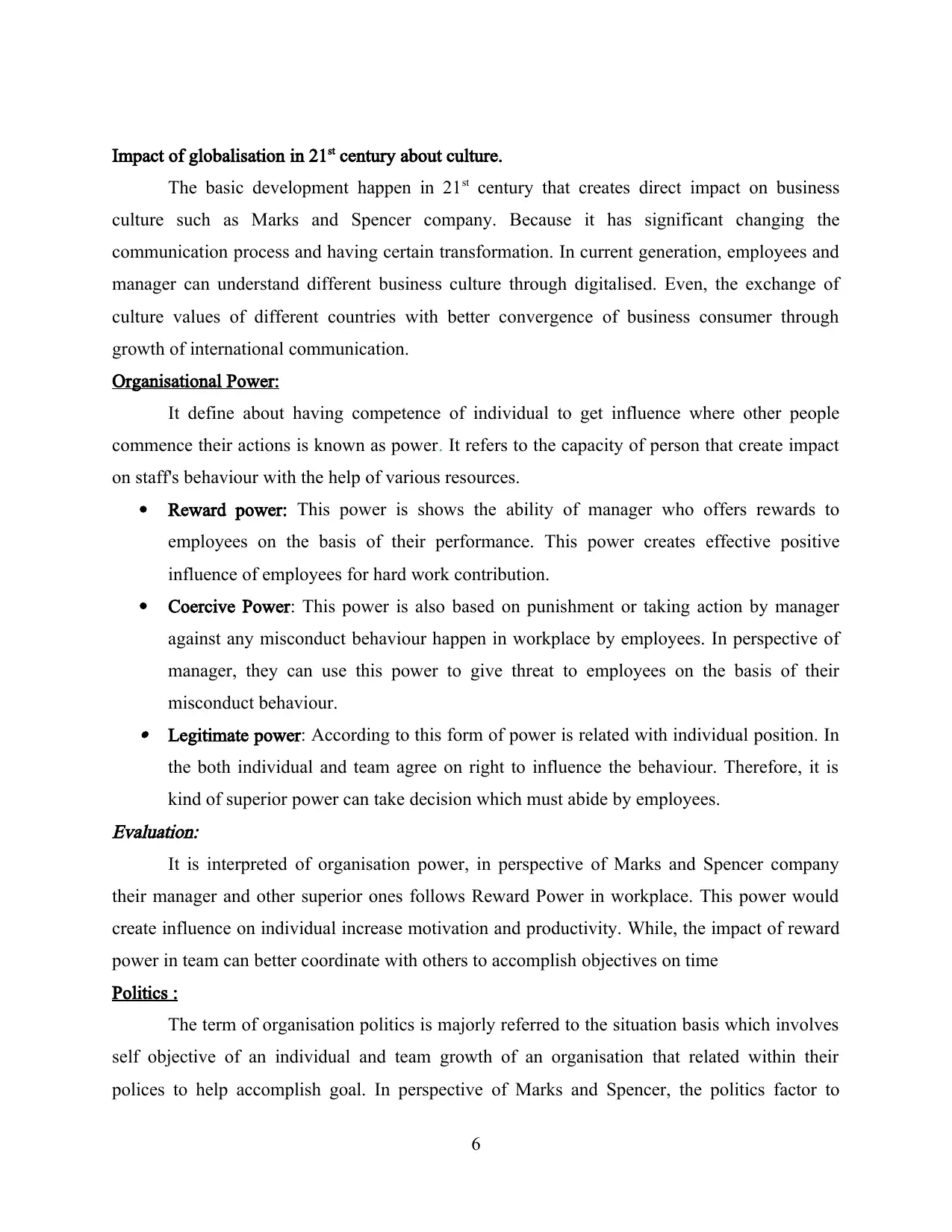
Impact of globalisation in 21st century about culture.
The basic development happen in 21st century that creates direct impact on business
culture such as Marks and Spencer company. Because it has significant changing the
communication process and having certain transformation. In current generation, employees and
manager can understand different business culture through digitalised. Even, the exchange of
culture values of different countries with better convergence of business consumer through
growth of international communication.
Organisational Power:
It define about having competence of individual to get influence where other people
commence their actions is known as power. It refers to the capacity of person that create impact
on staff's behaviour with the help of various resources.
Reward power: This power is shows the ability of manager who offers rewards to
employees on the basis of their performance. This power creates effective positive
influence of employees for hard work contribution.
Coercive Power: This power is also based on punishment or taking action by manager
against any misconduct behaviour happen in workplace by employees. In perspective of
manager, they can use this power to give threat to employees on the basis of their
misconduct behaviour. Legitimate power: According to this form of power is related with individual position. In
the both individual and team agree on right to influence the behaviour. Therefore, it is
kind of superior power can take decision which must abide by employees.Evaluation:
It is interpreted of organisation power, in perspective of Marks and Spencer company
their manager and other superior ones follows Reward Power in workplace. This power would
create influence on individual increase motivation and productivity. While, the impact of reward
power in team can better coordinate with others to accomplish objectives on time
Politics :
The term of organisation politics is majorly referred to the situation basis which involves
self objective of an individual and team growth of an organisation that related within their
polices to help accomplish goal. In perspective of Marks and Spencer, the politics factor to
6
The basic development happen in 21st century that creates direct impact on business
culture such as Marks and Spencer company. Because it has significant changing the
communication process and having certain transformation. In current generation, employees and
manager can understand different business culture through digitalised. Even, the exchange of
culture values of different countries with better convergence of business consumer through
growth of international communication.
Organisational Power:
It define about having competence of individual to get influence where other people
commence their actions is known as power. It refers to the capacity of person that create impact
on staff's behaviour with the help of various resources.
Reward power: This power is shows the ability of manager who offers rewards to
employees on the basis of their performance. This power creates effective positive
influence of employees for hard work contribution.
Coercive Power: This power is also based on punishment or taking action by manager
against any misconduct behaviour happen in workplace by employees. In perspective of
manager, they can use this power to give threat to employees on the basis of their
misconduct behaviour. Legitimate power: According to this form of power is related with individual position. In
the both individual and team agree on right to influence the behaviour. Therefore, it is
kind of superior power can take decision which must abide by employees.Evaluation:
It is interpreted of organisation power, in perspective of Marks and Spencer company
their manager and other superior ones follows Reward Power in workplace. This power would
create influence on individual increase motivation and productivity. While, the impact of reward
power in team can better coordinate with others to accomplish objectives on time
Politics :
The term of organisation politics is majorly referred to the situation basis which involves
self objective of an individual and team growth of an organisation that related within their
polices to help accomplish goal. In perspective of Marks and Spencer, the politics factor to
6
⊘ This is a preview!⊘
Do you want full access?
Subscribe today to unlock all pages.

Trusted by 1+ million students worldwide
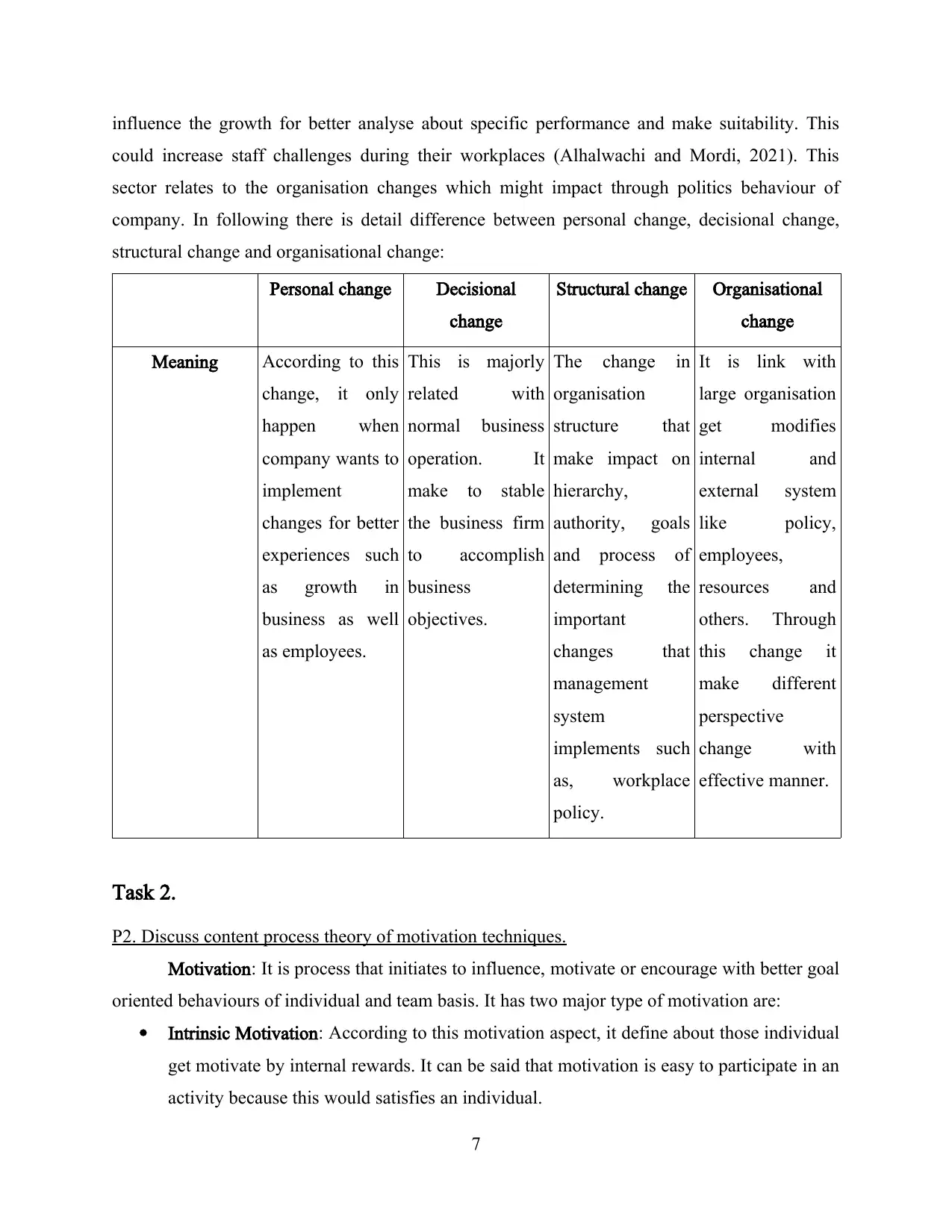
influence the growth for better analyse about specific performance and make suitability. This
could increase staff challenges during their workplaces (Alhalwachi and Mordi, 2021). This
sector relates to the organisation changes which might impact through politics behaviour of
company. In following there is detail difference between personal change, decisional change,
structural change and organisational change:
Personal change Decisional
change
Structural change Organisational
change
Meaning According to this
change, it only
happen when
company wants to
implement
changes for better
experiences such
as growth in
business as well
as employees.
This is majorly
related with
normal business
operation. It
make to stable
the business firm
to accomplish
business
objectives.
The change in
organisation
structure that
make impact on
hierarchy,
authority, goals
and process of
determining the
important
changes that
management
system
implements such
as, workplace
policy.
It is link with
large organisation
get modifies
internal and
external system
like policy,
employees,
resources and
others. Through
this change it
make different
perspective
change with
effective manner.
Task 2.
P2. Discuss content process theory of motivation techniques.
Motivation: It is process that initiates to influence, motivate or encourage with better goal
oriented behaviours of individual and team basis. It has two major type of motivation are:
Intrinsic Motivation: According to this motivation aspect, it define about those individual
get motivate by internal rewards. It can be said that motivation is easy to participate in an
activity because this would satisfies an individual.
7
could increase staff challenges during their workplaces (Alhalwachi and Mordi, 2021). This
sector relates to the organisation changes which might impact through politics behaviour of
company. In following there is detail difference between personal change, decisional change,
structural change and organisational change:
Personal change Decisional
change
Structural change Organisational
change
Meaning According to this
change, it only
happen when
company wants to
implement
changes for better
experiences such
as growth in
business as well
as employees.
This is majorly
related with
normal business
operation. It
make to stable
the business firm
to accomplish
business
objectives.
The change in
organisation
structure that
make impact on
hierarchy,
authority, goals
and process of
determining the
important
changes that
management
system
implements such
as, workplace
policy.
It is link with
large organisation
get modifies
internal and
external system
like policy,
employees,
resources and
others. Through
this change it
make different
perspective
change with
effective manner.
Task 2.
P2. Discuss content process theory of motivation techniques.
Motivation: It is process that initiates to influence, motivate or encourage with better goal
oriented behaviours of individual and team basis. It has two major type of motivation are:
Intrinsic Motivation: According to this motivation aspect, it define about those individual
get motivate by internal rewards. It can be said that motivation is easy to participate in an
activity because this would satisfies an individual.
7
Paraphrase This Document
Need a fresh take? Get an instant paraphrase of this document with our AI Paraphraser
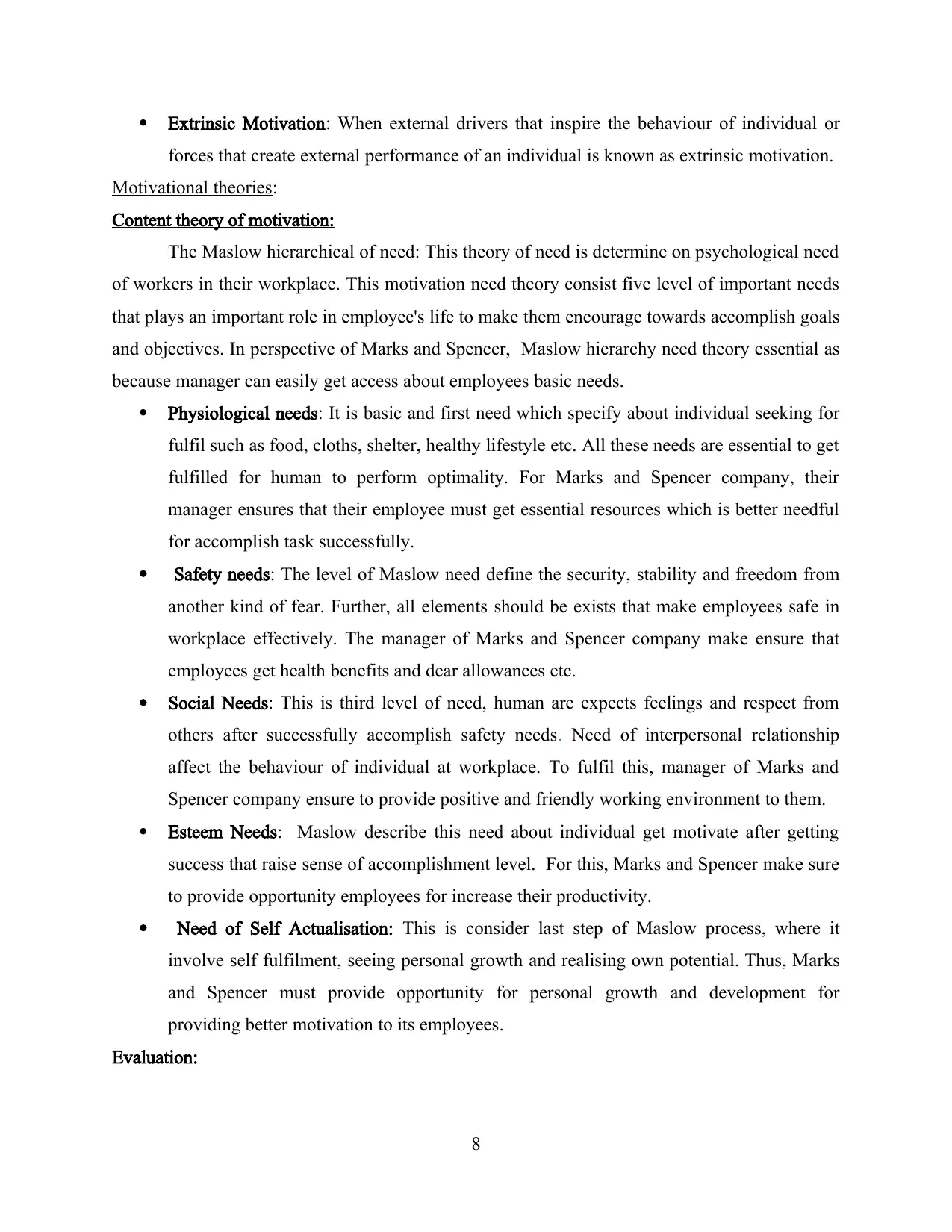
Extrinsic Motivation: When external drivers that inspire the behaviour of individual or
forces that create external performance of an individual is known as extrinsic motivation.
Motivational theories:
Content theory of motivation:
The Maslow hierarchical of need: This theory of need is determine on psychological need
of workers in their workplace. This motivation need theory consist five level of important needs
that plays an important role in employee's life to make them encourage towards accomplish goals
and objectives. In perspective of Marks and Spencer, Maslow hierarchy need theory essential as
because manager can easily get access about employees basic needs.
Physiological needs: It is basic and first need which specify about individual seeking for
fulfil such as food, cloths, shelter, healthy lifestyle etc. All these needs are essential to get
fulfilled for human to perform optimality. For Marks and Spencer company, their
manager ensures that their employee must get essential resources which is better needful
for accomplish task successfully.
Safety needs: The level of Maslow need define the security, stability and freedom from
another kind of fear. Further, all elements should be exists that make employees safe in
workplace effectively. The manager of Marks and Spencer company make ensure that
employees get health benefits and dear allowances etc.
Social Needs: This is third level of need, human are expects feelings and respect from
others after successfully accomplish safety needs. Need of interpersonal relationship
affect the behaviour of individual at workplace. To fulfil this, manager of Marks and
Spencer company ensure to provide positive and friendly working environment to them.
Esteem Needs: Maslow describe this need about individual get motivate after getting
success that raise sense of accomplishment level. For this, Marks and Spencer make sure
to provide opportunity employees for increase their productivity.
Need of Self Actualisation: This is consider last step of Maslow process, where it
involve self fulfilment, seeing personal growth and realising own potential. Thus, Marks
and Spencer must provide opportunity for personal growth and development for
providing better motivation to its employees.
Evaluation:
8
forces that create external performance of an individual is known as extrinsic motivation.
Motivational theories:
Content theory of motivation:
The Maslow hierarchical of need: This theory of need is determine on psychological need
of workers in their workplace. This motivation need theory consist five level of important needs
that plays an important role in employee's life to make them encourage towards accomplish goals
and objectives. In perspective of Marks and Spencer, Maslow hierarchy need theory essential as
because manager can easily get access about employees basic needs.
Physiological needs: It is basic and first need which specify about individual seeking for
fulfil such as food, cloths, shelter, healthy lifestyle etc. All these needs are essential to get
fulfilled for human to perform optimality. For Marks and Spencer company, their
manager ensures that their employee must get essential resources which is better needful
for accomplish task successfully.
Safety needs: The level of Maslow need define the security, stability and freedom from
another kind of fear. Further, all elements should be exists that make employees safe in
workplace effectively. The manager of Marks and Spencer company make ensure that
employees get health benefits and dear allowances etc.
Social Needs: This is third level of need, human are expects feelings and respect from
others after successfully accomplish safety needs. Need of interpersonal relationship
affect the behaviour of individual at workplace. To fulfil this, manager of Marks and
Spencer company ensure to provide positive and friendly working environment to them.
Esteem Needs: Maslow describe this need about individual get motivate after getting
success that raise sense of accomplishment level. For this, Marks and Spencer make sure
to provide opportunity employees for increase their productivity.
Need of Self Actualisation: This is consider last step of Maslow process, where it
involve self fulfilment, seeing personal growth and realising own potential. Thus, Marks
and Spencer must provide opportunity for personal growth and development for
providing better motivation to its employees.
Evaluation:
8
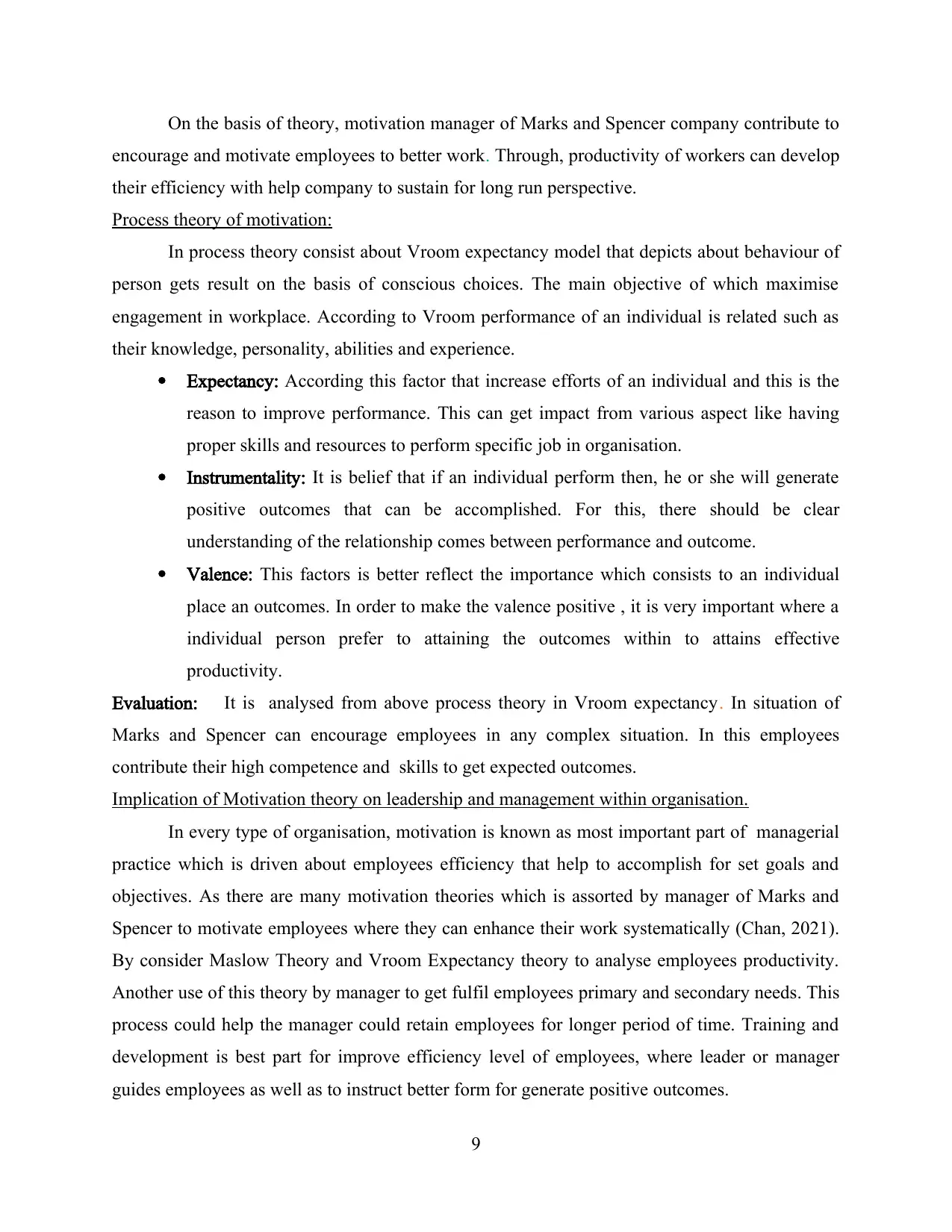
On the basis of theory, motivation manager of Marks and Spencer company contribute to
encourage and motivate employees to better work. Through, productivity of workers can develop
their efficiency with help company to sustain for long run perspective.
Process theory of motivation:
In process theory consist about Vroom expectancy model that depicts about behaviour of
person gets result on the basis of conscious choices. The main objective of which maximise
engagement in workplace. According to Vroom performance of an individual is related such as
their knowledge, personality, abilities and experience.
Expectancy: According this factor that increase efforts of an individual and this is the
reason to improve performance. This can get impact from various aspect like having
proper skills and resources to perform specific job in organisation.
Instrumentality: It is belief that if an individual perform then, he or she will generate
positive outcomes that can be accomplished. For this, there should be clear
understanding of the relationship comes between performance and outcome.
Valence: This factors is better reflect the importance which consists to an individual
place an outcomes. In order to make the valence positive , it is very important where a
individual person prefer to attaining the outcomes within to attains effective
productivity.
Evaluation: It is analysed from above process theory in Vroom expectancy. In situation of
Marks and Spencer can encourage employees in any complex situation. In this employees
contribute their high competence and skills to get expected outcomes.
Implication of Motivation theory on leadership and management within organisation.
In every type of organisation, motivation is known as most important part of managerial
practice which is driven about employees efficiency that help to accomplish for set goals and
objectives. As there are many motivation theories which is assorted by manager of Marks and
Spencer to motivate employees where they can enhance their work systematically (Chan, 2021).
By consider Maslow Theory and Vroom Expectancy theory to analyse employees productivity.
Another use of this theory by manager to get fulfil employees primary and secondary needs. This
process could help the manager could retain employees for longer period of time. Training and
development is best part for improve efficiency level of employees, where leader or manager
guides employees as well as to instruct better form for generate positive outcomes.
9
encourage and motivate employees to better work. Through, productivity of workers can develop
their efficiency with help company to sustain for long run perspective.
Process theory of motivation:
In process theory consist about Vroom expectancy model that depicts about behaviour of
person gets result on the basis of conscious choices. The main objective of which maximise
engagement in workplace. According to Vroom performance of an individual is related such as
their knowledge, personality, abilities and experience.
Expectancy: According this factor that increase efforts of an individual and this is the
reason to improve performance. This can get impact from various aspect like having
proper skills and resources to perform specific job in organisation.
Instrumentality: It is belief that if an individual perform then, he or she will generate
positive outcomes that can be accomplished. For this, there should be clear
understanding of the relationship comes between performance and outcome.
Valence: This factors is better reflect the importance which consists to an individual
place an outcomes. In order to make the valence positive , it is very important where a
individual person prefer to attaining the outcomes within to attains effective
productivity.
Evaluation: It is analysed from above process theory in Vroom expectancy. In situation of
Marks and Spencer can encourage employees in any complex situation. In this employees
contribute their high competence and skills to get expected outcomes.
Implication of Motivation theory on leadership and management within organisation.
In every type of organisation, motivation is known as most important part of managerial
practice which is driven about employees efficiency that help to accomplish for set goals and
objectives. As there are many motivation theories which is assorted by manager of Marks and
Spencer to motivate employees where they can enhance their work systematically (Chan, 2021).
By consider Maslow Theory and Vroom Expectancy theory to analyse employees productivity.
Another use of this theory by manager to get fulfil employees primary and secondary needs. This
process could help the manager could retain employees for longer period of time. Training and
development is best part for improve efficiency level of employees, where leader or manager
guides employees as well as to instruct better form for generate positive outcomes.
9
⊘ This is a preview!⊘
Do you want full access?
Subscribe today to unlock all pages.

Trusted by 1+ million students worldwide
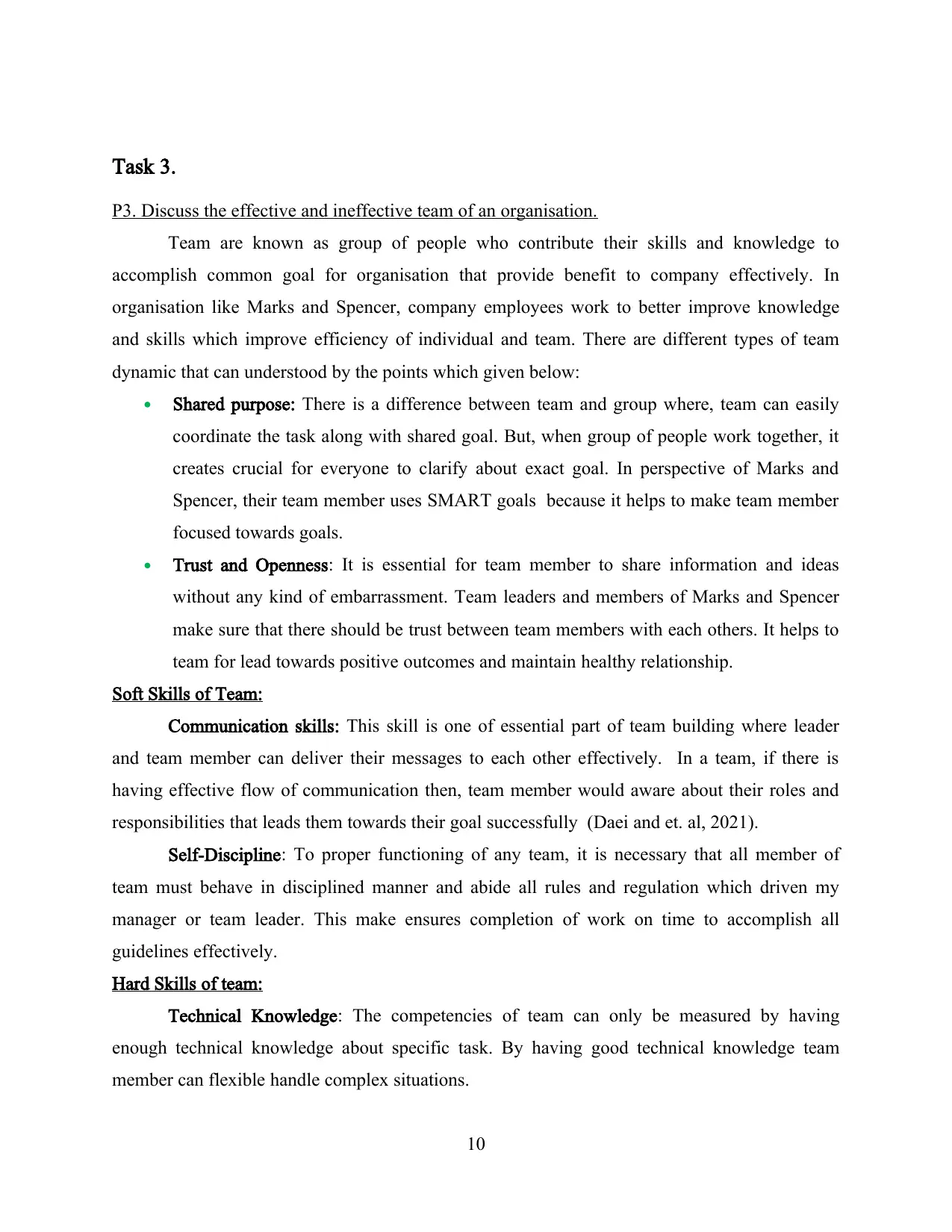
Task 3.
P3. Discuss the effective and ineffective team of an organisation.
Team are known as group of people who contribute their skills and knowledge to
accomplish common goal for organisation that provide benefit to company effectively. In
organisation like Marks and Spencer, company employees work to better improve knowledge
and skills which improve efficiency of individual and team. There are different types of team
dynamic that can understood by the points which given below:
Shared purpose: There is a difference between team and group where, team can easily
coordinate the task along with shared goal. But, when group of people work together, it
creates crucial for everyone to clarify about exact goal. In perspective of Marks and
Spencer, their team member uses SMART goals because it helps to make team member
focused towards goals.
Trust and Openness: It is essential for team member to share information and ideas
without any kind of embarrassment. Team leaders and members of Marks and Spencer
make sure that there should be trust between team members with each others. It helps to
team for lead towards positive outcomes and maintain healthy relationship.
Soft Skills of Team:
Communication skills: This skill is one of essential part of team building where leader
and team member can deliver their messages to each other effectively. In a team, if there is
having effective flow of communication then, team member would aware about their roles and
responsibilities that leads them towards their goal successfully (Daei and et. al, 2021).
Self-Discipline: To proper functioning of any team, it is necessary that all member of
team must behave in disciplined manner and abide all rules and regulation which driven my
manager or team leader. This make ensures completion of work on time to accomplish all
guidelines effectively.
Hard Skills of team:
Technical Knowledge: The competencies of team can only be measured by having
enough technical knowledge about specific task. By having good technical knowledge team
member can flexible handle complex situations.
10
P3. Discuss the effective and ineffective team of an organisation.
Team are known as group of people who contribute their skills and knowledge to
accomplish common goal for organisation that provide benefit to company effectively. In
organisation like Marks and Spencer, company employees work to better improve knowledge
and skills which improve efficiency of individual and team. There are different types of team
dynamic that can understood by the points which given below:
Shared purpose: There is a difference between team and group where, team can easily
coordinate the task along with shared goal. But, when group of people work together, it
creates crucial for everyone to clarify about exact goal. In perspective of Marks and
Spencer, their team member uses SMART goals because it helps to make team member
focused towards goals.
Trust and Openness: It is essential for team member to share information and ideas
without any kind of embarrassment. Team leaders and members of Marks and Spencer
make sure that there should be trust between team members with each others. It helps to
team for lead towards positive outcomes and maintain healthy relationship.
Soft Skills of Team:
Communication skills: This skill is one of essential part of team building where leader
and team member can deliver their messages to each other effectively. In a team, if there is
having effective flow of communication then, team member would aware about their roles and
responsibilities that leads them towards their goal successfully (Daei and et. al, 2021).
Self-Discipline: To proper functioning of any team, it is necessary that all member of
team must behave in disciplined manner and abide all rules and regulation which driven my
manager or team leader. This make ensures completion of work on time to accomplish all
guidelines effectively.
Hard Skills of team:
Technical Knowledge: The competencies of team can only be measured by having
enough technical knowledge about specific task. By having good technical knowledge team
member can flexible handle complex situations.
10
Paraphrase This Document
Need a fresh take? Get an instant paraphrase of this document with our AI Paraphraser
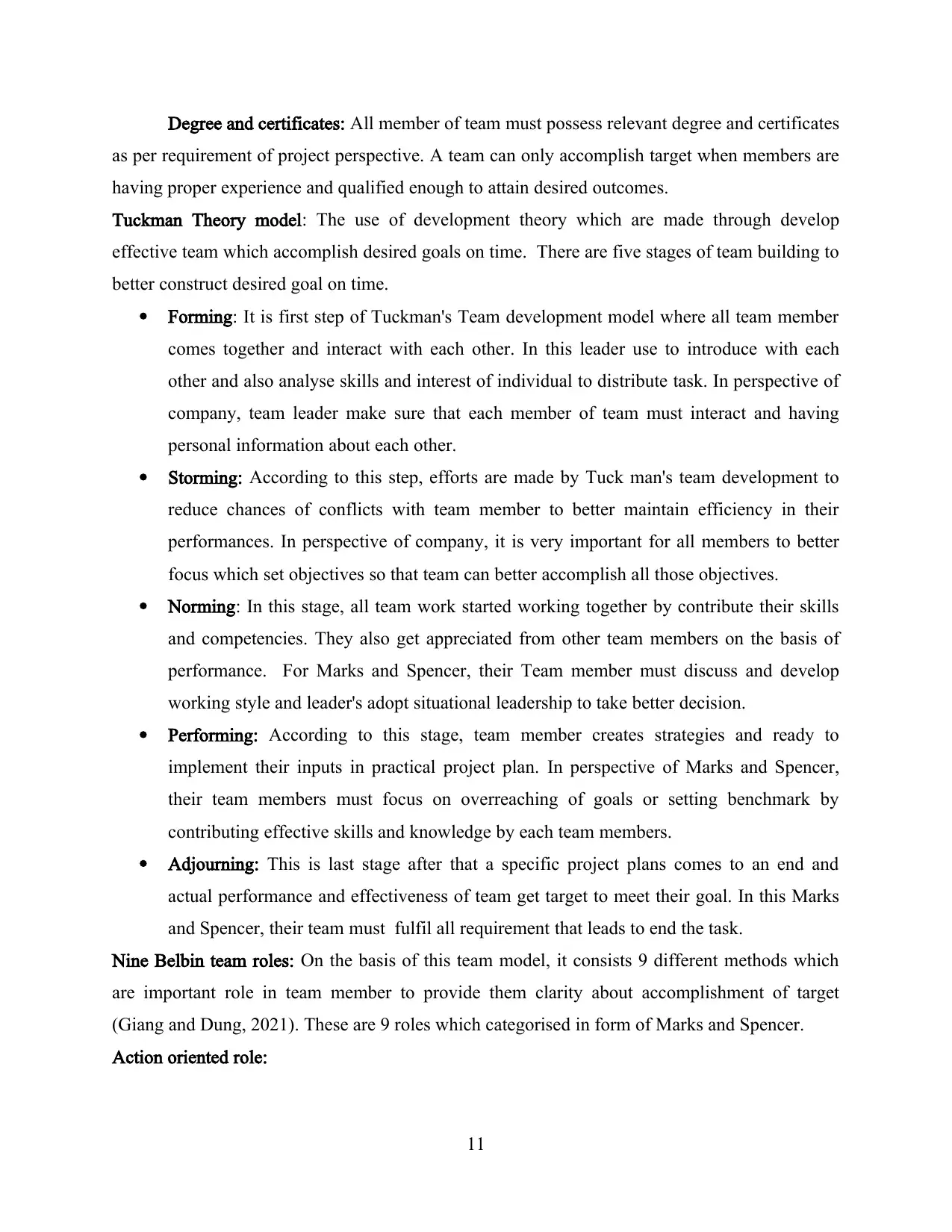
Degree and certificates: All member of team must possess relevant degree and certificates
as per requirement of project perspective. A team can only accomplish target when members are
having proper experience and qualified enough to attain desired outcomes.
Tuckman Theory model: The use of development theory which are made through develop
effective team which accomplish desired goals on time. There are five stages of team building to
better construct desired goal on time.
Forming: It is first step of Tuckman's Team development model where all team member
comes together and interact with each other. In this leader use to introduce with each
other and also analyse skills and interest of individual to distribute task. In perspective of
company, team leader make sure that each member of team must interact and having
personal information about each other.
Storming: According to this step, efforts are made by Tuck man's team development to
reduce chances of conflicts with team member to better maintain efficiency in their
performances. In perspective of company, it is very important for all members to better
focus which set objectives so that team can better accomplish all those objectives.
Norming: In this stage, all team work started working together by contribute their skills
and competencies. They also get appreciated from other team members on the basis of
performance. For Marks and Spencer, their Team member must discuss and develop
working style and leader's adopt situational leadership to take better decision.
Performing: According to this stage, team member creates strategies and ready to
implement their inputs in practical project plan. In perspective of Marks and Spencer,
their team members must focus on overreaching of goals or setting benchmark by
contributing effective skills and knowledge by each team members.
Adjourning: This is last stage after that a specific project plans comes to an end and
actual performance and effectiveness of team get target to meet their goal. In this Marks
and Spencer, their team must fulfil all requirement that leads to end the task.
Nine Belbin team roles: On the basis of this team model, it consists 9 different methods which
are important role in team member to provide them clarity about accomplishment of target
(Giang and Dung, 2021). These are 9 roles which categorised in form of Marks and Spencer.
Action oriented role:
11
as per requirement of project perspective. A team can only accomplish target when members are
having proper experience and qualified enough to attain desired outcomes.
Tuckman Theory model: The use of development theory which are made through develop
effective team which accomplish desired goals on time. There are five stages of team building to
better construct desired goal on time.
Forming: It is first step of Tuckman's Team development model where all team member
comes together and interact with each other. In this leader use to introduce with each
other and also analyse skills and interest of individual to distribute task. In perspective of
company, team leader make sure that each member of team must interact and having
personal information about each other.
Storming: According to this step, efforts are made by Tuck man's team development to
reduce chances of conflicts with team member to better maintain efficiency in their
performances. In perspective of company, it is very important for all members to better
focus which set objectives so that team can better accomplish all those objectives.
Norming: In this stage, all team work started working together by contribute their skills
and competencies. They also get appreciated from other team members on the basis of
performance. For Marks and Spencer, their Team member must discuss and develop
working style and leader's adopt situational leadership to take better decision.
Performing: According to this stage, team member creates strategies and ready to
implement their inputs in practical project plan. In perspective of Marks and Spencer,
their team members must focus on overreaching of goals or setting benchmark by
contributing effective skills and knowledge by each team members.
Adjourning: This is last stage after that a specific project plans comes to an end and
actual performance and effectiveness of team get target to meet their goal. In this Marks
and Spencer, their team must fulfil all requirement that leads to end the task.
Nine Belbin team roles: On the basis of this team model, it consists 9 different methods which
are important role in team member to provide them clarity about accomplishment of target
(Giang and Dung, 2021). These are 9 roles which categorised in form of Marks and Spencer.
Action oriented role:
11
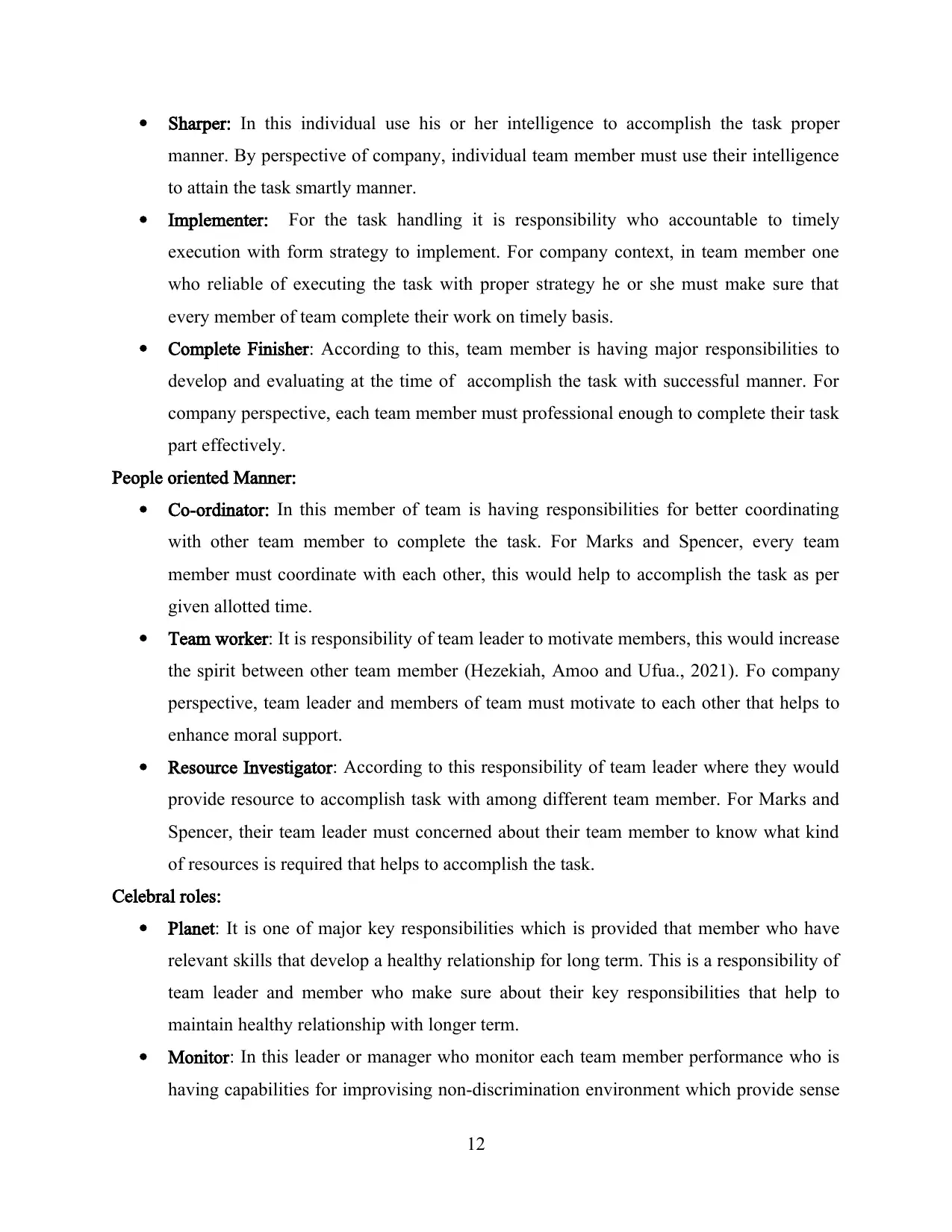
Sharper: In this individual use his or her intelligence to accomplish the task proper
manner. By perspective of company, individual team member must use their intelligence
to attain the task smartly manner.
Implementer: For the task handling it is responsibility who accountable to timely
execution with form strategy to implement. For company context, in team member one
who reliable of executing the task with proper strategy he or she must make sure that
every member of team complete their work on timely basis.
Complete Finisher: According to this, team member is having major responsibilities to
develop and evaluating at the time of accomplish the task with successful manner. For
company perspective, each team member must professional enough to complete their task
part effectively.
People oriented Manner:
Co-ordinator: In this member of team is having responsibilities for better coordinating
with other team member to complete the task. For Marks and Spencer, every team
member must coordinate with each other, this would help to accomplish the task as per
given allotted time.
Team worker: It is responsibility of team leader to motivate members, this would increase
the spirit between other team member (Hezekiah, Amoo and Ufua., 2021). Fo company
perspective, team leader and members of team must motivate to each other that helps to
enhance moral support.
Resource Investigator: According to this responsibility of team leader where they would
provide resource to accomplish task with among different team member. For Marks and
Spencer, their team leader must concerned about their team member to know what kind
of resources is required that helps to accomplish the task.
Celebral roles:
Planet: It is one of major key responsibilities which is provided that member who have
relevant skills that develop a healthy relationship for long term. This is a responsibility of
team leader and member who make sure about their key responsibilities that help to
maintain healthy relationship with longer term.
Monitor: In this leader or manager who monitor each team member performance who is
having capabilities for improvising non-discrimination environment which provide sense
12
manner. By perspective of company, individual team member must use their intelligence
to attain the task smartly manner.
Implementer: For the task handling it is responsibility who accountable to timely
execution with form strategy to implement. For company context, in team member one
who reliable of executing the task with proper strategy he or she must make sure that
every member of team complete their work on timely basis.
Complete Finisher: According to this, team member is having major responsibilities to
develop and evaluating at the time of accomplish the task with successful manner. For
company perspective, each team member must professional enough to complete their task
part effectively.
People oriented Manner:
Co-ordinator: In this member of team is having responsibilities for better coordinating
with other team member to complete the task. For Marks and Spencer, every team
member must coordinate with each other, this would help to accomplish the task as per
given allotted time.
Team worker: It is responsibility of team leader to motivate members, this would increase
the spirit between other team member (Hezekiah, Amoo and Ufua., 2021). Fo company
perspective, team leader and members of team must motivate to each other that helps to
enhance moral support.
Resource Investigator: According to this responsibility of team leader where they would
provide resource to accomplish task with among different team member. For Marks and
Spencer, their team leader must concerned about their team member to know what kind
of resources is required that helps to accomplish the task.
Celebral roles:
Planet: It is one of major key responsibilities which is provided that member who have
relevant skills that develop a healthy relationship for long term. This is a responsibility of
team leader and member who make sure about their key responsibilities that help to
maintain healthy relationship with longer term.
Monitor: In this leader or manager who monitor each team member performance who is
having capabilities for improvising non-discrimination environment which provide sense
12
⊘ This is a preview!⊘
Do you want full access?
Subscribe today to unlock all pages.

Trusted by 1+ million students worldwide
1 out of 19
Related Documents
Your All-in-One AI-Powered Toolkit for Academic Success.
+13062052269
info@desklib.com
Available 24*7 on WhatsApp / Email
![[object Object]](/_next/static/media/star-bottom.7253800d.svg)
Unlock your academic potential
Copyright © 2020–2026 A2Z Services. All Rights Reserved. Developed and managed by ZUCOL.




